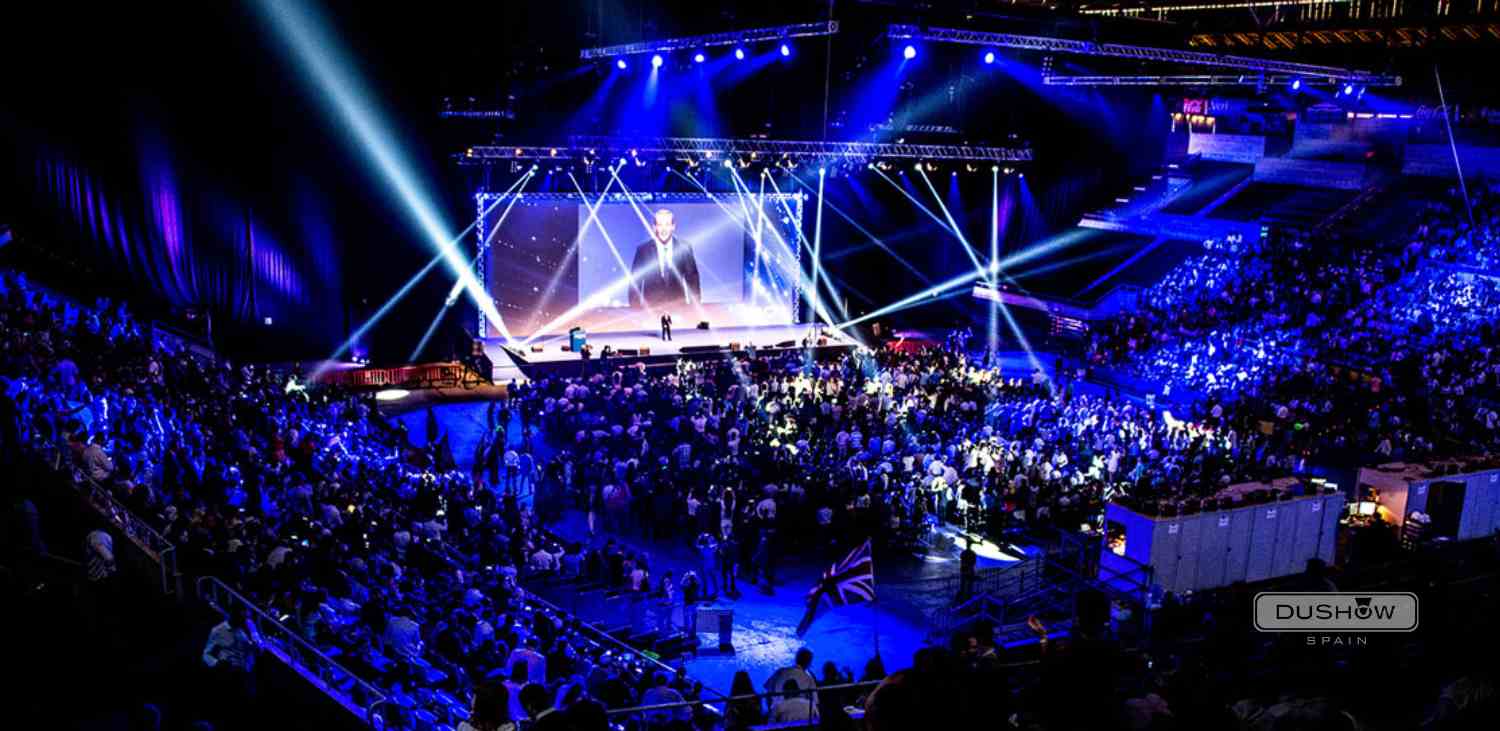Exactly How Event Production Functions: A Comprehensive Check Out the Refine
Event production is a complicated and structured process that requires mindful preparation and implementation. It begins with establishing clear objectives and understanding the target market. Each action, from budgeting to location choice, plays an important function in guaranteeing success. As the process unravels, different components need to line up seamlessly. The subtleties of this complex operation often go undetected. What are the essential stages that add to an unforgettable event?

The Preliminary Drawing Board
When starting on event production, careful planning is important to ensure a successful outcome. The initial drawing board offers as the structure for all succeeding efforts. During this phase, event manufacturers have to specify the event's objective and goals clearly. Determining the target audience helps customize the experience and messaging, ensuring significance and engagement.Producers need to likewise consider the event format, whether it be in-person, digital, or crossbreed, as this will certainly influence various logistical elements. Picking an ideal day and location is vital, as it impacts accessibility and availability.Furthermore, assembling a reliable group is essential for dividing responsibilities and simplifying communication. Establishing a timeline with landmarks assurances all tasks are finished on time. This stage entails complete research study, including identifying potential obstacles and creating techniques to mitigate threats. Eventually, a well-structured initial preparation stage establishes the tone for a successful event production trip.

Budgeting and Source Allotment
In event production, reliable budgeting and resource appropriation are crucial for success - event production charlotte. Developing economic specifications establishes the structure for all succeeding choices, while source distribution methods assure that every component of the event is sufficiently sustained. With each other, these elements help maintain control over expenditures and enhance the usage of readily available sources
Establishing Financial Parameters
Establishing monetary specifications is crucial to the success of any kind of event production, as it sets the foundation for effective budgeting and resource allotment. This process begins with defining the general budget plan, which incorporates all facets of the event, consisting of place costs, event catering, and advertising. By determining readily available funds, event organizers can focus on expenditures and designate resources appropriately. Furthermore, it is vital to conduct thorough market study to anticipate possible expenses and identify funding sources, such as sponsorships or ticket sales. Establishing clear financial specifications also aids in threat administration, enabling planners to reserve contingency funds for unexpected expenditures. Eventually, a well-defined budget acts as a roadmap, directing the event production team in the direction of accomplishing their goals while keeping monetary control.
Resource Circulation Techniques
Effective source distribution approaches are necessary for making the most of the influence of an event while sticking to budget plan restraints. Successful event production calls for a precise approach to budgeting and resource allocation. Coordinators must focus on important components such as venue, wedding catering, and technology, making certain that funds are assigned to locations that enhance guest experience. A thorough budget needs to outline anticipated expenditures and identify locations for potential expense financial savings, such as negotiating with vendors or discovering sponsorship opportunities. Furthermore, tracking expenses throughout the preparation procedure helps stop overspending. By employing calculated source circulation, event manufacturers can supply a memorable experience while preserving monetary duty, ultimately contributing to the overall success of the event.
Location Choice and Logistics
Picking the appropriate venue is important to the success of any type of event, as it sets the stage for the general experience. Location choice includes assessing different aspects, including capability, availability, and place. Coordinators should think about the target audience and the nature of the event, guaranteeing the venue aligns with the event's goals.Logistics play a substantial duty in this procedure, including plans for seating, audiovisual equipment, and providing solutions. A well-chosen place needs to assist in smooth flow for attendees and staff, boosting engagement.Additionally, examining prospective venues for amenities like parking, toilets, and fire escape is necessary for safety and security and comfort. The timeline for protecting the venue is additionally vital, as popular areas may book swiftly - event production charlotte. Comprehensive preparation and timely implementation can ultimately contribute to a smooth event experience, making venue option and logistics fundamental elements of successful event production.
Innovative Principle Development
While the place sets the physical stage, imaginative concept advancement forms the event's identity and narrative. This procedure starts with determining the event's objective and target audience, enabling event manufacturers to formulate a compelling motif that resonates with attendees. Conceptualizing sessions often consist of varied viewpoints, fostering ingenious concepts that straighten with the event's goals.Once a theme is established, aesthetic components such as shade palettes, signage, and design are created to boost the overall atmosphere. Storytelling methods might additionally be incorporated to develop an interesting journey for participants, guaranteeing a memorable experience. Furthermore, considerations relating to amusement, tasks, and interactive parts are straightened with the selected idea, strengthening the style throughout the event.Ultimately, reliable creative concept development guarantees that every aspect of the event functions cohesively, leaving a lasting impact on participants and meeting the event's purposes. This fundamental work top article prepares for subsequent preparation and implementation phases.
Working together With Vendors and Providers
Successful event production depends upon reliable partnership with vendors and providers. Selecting reliable companions, discussing contracts effectively, and ensuring timely distributions are important steps in this procedure. Each of these elements adds greatly to the total success and smooth implementation of an event.
Choosing Reliable Allies
Exactly how can event planners ensure a seamless production experience? Picking trusted companions is important in achieving this objective. Event planners have to carry out thorough study to identify suppliers and providers with a tried and tested track record of quality. This includes examining references, assessing portfolios, and examining customer comments. Planners ought to focus on partners who show professionalism and reliability, prompt communication, and a desire to team up. Building strong partnerships fosters count on and makes it possible for quick problem-solving throughout the event. In addition, it is advantageous to select neighborhood vendors who comprehend the place and local logistics. Ultimately, a successful event pivots on the harmony in between planners and their partners, making sure that every facet of production runs efficiently and successfully.
Negotiating Contracts Successfully
Reliable arrangement of agreements is a vital step in the collaboration between event coordinators and their suppliers and distributors. This process involves clear communication of expectations, deliverables, and timelines. Planners ought to conduct extensive research study on market rates and market requirements to establish a baseline for negotiations. It is necessary to create a collaborative ambience, urging open discussion regarding terms, prices, and potential contingencies. Organizers need to additionally focus on comprehending the vendor's capabilities and constraints to straighten their requirements efficiently. Flexibility can bring about equally useful contracts, fostering lasting connections. Crafting well-defined agreements that include specific efficiency metrics can assist guarantee accountability, eventually bring about successful event execution and contentment for all events included.
Guaranteeing Prompt Shipments
Timely shipments are vital for the smooth implementation of any type of event, requiring thorough partnership in between planners and their suppliers and providers. Reliable communication is essential, as it helps develop clear expectations relating to delivery routines, amounts, and particular needs. Planners commonly create comprehensive timelines to lay out vital landmarks, guaranteeing all events remain lined up throughout the procedure. Regular check-ins with vendors can assist recognize potential delays early, permitting proactive services. Furthermore, constructing strong relationships with trustworthy distributors fosters count on and responsibility, which can anonymous cause better service and prioritization. By prioritizing these collective efforts, coordinators can decrease disturbances, thereby enhancing the overall efficiency of event production and guaranteeing that all required materials and services arrive as planned.
Marketing and Promotion Strategies
While arranging an occasion, the success of advertising and promotion approaches can substantially affect attendance and engagement. Reliable methods typically include a mix of digital marketing, typical advertising and marketing, and grassroots outreach. Using social media systems permits real-time communication and targeted marketing, reaching certain demographics efficiently. Email advertising and marketing projects can further involve potential guests with personalized web content and reminders.Collaborations with influencers or sector leaders can likewise boost integrity and widen reach. Producing engaging material, such as video clips or blogs, assists to create buzz and endure passion leading up to the event. Furthermore, leveraging early-bird price cuts and exclusive advantages can incentivize ticket purchases.Promoting via conventional networks, such as posters or neighborhood media, remains appropriate, specifically in community-focused occasions. A complete strategy that integrates several methods warranties maximum visibility and interaction, inevitably adding to the event's success and the creation of an unforgettable experience for guests.
On-Site Implementation and Monitoring
On-site execution and management are vital components that figure out the total success of an occasion. Effective coordination during the event guarantees that all elements align with the prepared program. Event managers supervise logistics, including vendor sychronisation, devices configuration, and guest services. Keeping an eye on timelines and resolving any kind of unanticipated concerns are essential for preserving a seamless experience.The staff plays a significant role, as trained personnel are responsible for numerous jobs such as registration, information dissemination, and technological assistance. Communication among employee is critical; it cultivates a collective environment and enables fast resolution of challenges.Additionally, security protocols must be stuck to, securing the well-being of all participants. Post-event examinations are likewise component of on-site administration, offering understandings for future enhancements. By focusing on these facets, event producers can develop unforgettable experiences that meet or go beyond attendee assumptions while accomplishing the event's purposes.
Often Asked Inquiries
Exactly how Do I Choose the Right Event Style?
Choosing the ideal event theme entails considering the target audience, event objective, and venue. Looking into current patterns and gathering input from stakeholders can likewise influence imaginative ideas that reverberate and develop a memorable experience.

What Prevail Mistakes in Event Production?
Usual errors in event production typically include poor preparation, poor interaction among employee, budget plan mismanagement, neglecting to take into consideration the audience's demands, and falling short to conduct a thorough post-event examination for future enhancements.
Just How Can I Determine Event Success?
To measure event Click This Link success, one can examine attendee contentment, interaction degrees, budget adherence, and post-event responses. Key efficiency indicators, such as ticket sales and social media sites interactions, additionally provide useful insights into total effectiveness.
What Should I Do if It Moistens the Event Day?
In the event of moisten the day, the coordinator should carry out backup plans, such as protecting outdoors tents or moving activities inside. Communication with guests about modifications is necessary to ensure a smooth experience regardless of climate challenges.
Exactly How Can I Ensure Attendee Engagement During the Event?
